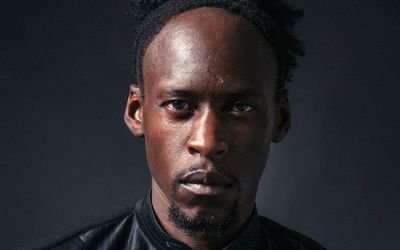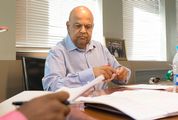Capso rings the changes with phone talent search
by Graham Wood,
2016-03-29 05:36:42.0
CAPSO is a new-generation artist, producer and businessman who is revolutionising music with the reach of mobile technology.
Not only has he had a number of South African and international hits — originally under the name Capsolys — he has also performed on stage with Akon, and collaborated in the studio with Wyclef Jean.
In addition, he runs his own recording and production studio, Wired Sound Studios, in Johannesburg.
Capso has combined his business and musical acumen with an early insight into the extraordinary reach of mobile technology to uncover untapped singing talent from Africa. The result, Airtel Trace Music Stars, has shifted the basis of traditional televised song competitions.
When Capso pitched the concept of a talent competition, where the casting is made digitally via cellphone, computer, or tablet, the French-based international music channel Trace TV leapt at the opportunity and Trace Music Stars was born.
Capso took on the role of global project manager, heading a team of 32 people across several continents and handling the creative direction.
He even designed and engineered the set-up of the interactive voice response system, and hosted the grand finales of seasons one and two.
Trace Music Stars immediately became the Africa’s biggest music talent search, involving 14 countries and more than 2.3-million calls. The third edition is under way.
Capso (real name Jimmy Muteba) was born in the Democratic Republic of Congo (DRC) to Belgian-raised parents, raised in SA and is a citizen of the world. He has spent time in the UK and France, largely because of his close connection to the French language through his roots in the DRC.
His father is a pastor, so Capso was exposed to the power of music from an early age. When his older brother set up a home recording studio at the back of their house when Capso was still a child, he began experimenting with recording and producing — and has never stopped.
...
When he first became aware of hip hop, Capso was dazzled by its potential for expression and conveying emotion.
"Already for me, music was religion, but hip hop was a revolution," he says.
"It allowed you to do whatever you wanted."
He pursued it passionately, developing his signature blend of French hip hop with US influences and African roots.
Despite a rebellious childhood, Capso attended university, studying towards a degree in commerce, which has served him well in his business endeavours. However, he gave up his studies after he signed his first album deal on the strength of a demo he recorded on his own steam.
His first album in 2004, Things Are As They Are (David Gresham Records), included the tracks Afrika and How R Things (with vocalist Tamara Dey), which were on high rotation on radio stations around the country.
Coincidentally, Afrika was featured in Celtel commercials for many years.
Celtel was acquired by Airtel, which a decade later would go on to become the sponsor of Airtel Trace Music Stars. After spending several years living in the UK, performing and producing in London, Capso returned to SA, started his own record label and bought back the rights to his first album.
...
He recorded a music video that was picked up by Trace TV and received frequent play throughout the world.
As a result, he met with the channel’s CEO on a trip to France and began consulting for the company.
While producing several compilation CDs and gathering Pan-African fame, Capso was approached by aspirant musicians with their demo tapes. His growing awareness of the power of cellphone technology planted the seed for a new kind of talent search.
He realised that by using mobile technology to circumvent the usual barriers to access, he could help empower unknown musicians.
"The internet and mobile phones have changed the way we connect with artists and with brands," Capso says.
"I realised that it could also change the way the music world could connect with undiscovered talent."
Capso has pioneered a way of tapping into new music talent in a game-changing way that will forever mark a watershed moment in musical and technological history.

Airtel Trace Music Stars creator Capso — also known as Capsolys — has transformed the way talent competitions are run by using cellphone and other digital technologies to connect with aspirant singers from across Africa. Picture: SUPPLIED
CAPSO is a new-generation artist, producer and businessman who is revolutionising music with the reach of mobile technology.
Not only has he had a number of South African and international hits — originally under the name Capsolys — he has also performed on stage with Akon, and collaborated in the studio with Wyclef Jean.
In addition, he runs his own recording and production studio, Wired Sound Studios, in Johannesburg.
Capso has combined his business and musical acumen with an early insight into the extraordinary reach of mobile technology to uncover untapped singing talent from Africa. The result, Airtel Trace Music Stars, has shifted the basis of traditional televised song competitions.
When Capso pitched the concept of a talent competition, where the casting is made digitally via cellphone, computer, or tablet, the French-based international music channel Trace TV leapt at the opportunity and Trace Music Stars was born.
Capso took on the role of global project manager, heading a team of 32 people across several continents and handling the creative direction.
He even designed and engineered the set-up of the interactive voice response system, and hosted the grand finales of seasons one and two.
Trace Music Stars immediately became the Africa’s biggest music talent search, involving 14 countries and more than 2.3-million calls. The third edition is under way.
Capso (real name Jimmy Muteba) was born in the Democratic Republic of Congo (DRC) to Belgian-raised parents, raised in SA and is a citizen of the world. He has spent time in the UK and France, largely because of his close connection to the French language through his roots in the DRC.
His father is a pastor, so Capso was exposed to the power of music from an early age. When his older brother set up a home recording studio at the back of their house when Capso was still a child, he began experimenting with recording and producing — and has never stopped.
...
When he first became aware of hip hop, Capso was dazzled by its potential for expression and conveying emotion.
"Already for me, music was religion, but hip hop was a revolution," he says.
"It allowed you to do whatever you wanted."
He pursued it passionately, developing his signature blend of French hip hop with US influences and African roots.
Despite a rebellious childhood, Capso attended university, studying towards a degree in commerce, which has served him well in his business endeavours. However, he gave up his studies after he signed his first album deal on the strength of a demo he recorded on his own steam.
His first album in 2004, Things Are As They Are (David Gresham Records), included the tracks Afrika and How R Things (with vocalist Tamara Dey), which were on high rotation on radio stations around the country.
Coincidentally, Afrika was featured in Celtel commercials for many years.
Celtel was acquired by Airtel, which a decade later would go on to become the sponsor of Airtel Trace Music Stars. After spending several years living in the UK, performing and producing in London, Capso returned to SA, started his own record label and bought back the rights to his first album.
...
He recorded a music video that was picked up by Trace TV and received frequent play throughout the world.
As a result, he met with the channel’s CEO on a trip to France and began consulting for the company.
While producing several compilation CDs and gathering Pan-African fame, Capso was approached by aspirant musicians with their demo tapes. His growing awareness of the power of cellphone technology planted the seed for a new kind of talent search.
He realised that by using mobile technology to circumvent the usual barriers to access, he could help empower unknown musicians.
"The internet and mobile phones have changed the way we connect with artists and with brands," Capso says.
"I realised that it could also change the way the music world could connect with undiscovered talent."
Capso has pioneered a way of tapping into new music talent in a game-changing way that will forever mark a watershed moment in musical and technological history.





















Change: 1.37%
Change: 1.32%
Change: 2.91%
Change: 0.45%
Change: 3.09%
Data supplied by Profile Data
Change: 1.59%
Change: 0.47%
Change: 1.37%
Change: 0.00%
Change: 0.44%
Data supplied by Profile Data
Change: 0.23%
Change: -0.03%
Change: 0.06%
Change: 0.30%
Change: 0.00%
Data supplied by Profile Data
Change: 0.25%
Change: 0.31%
Change: 0.13%
Change: 0.36%
Change: -0.66%
Data supplied by Profile Data